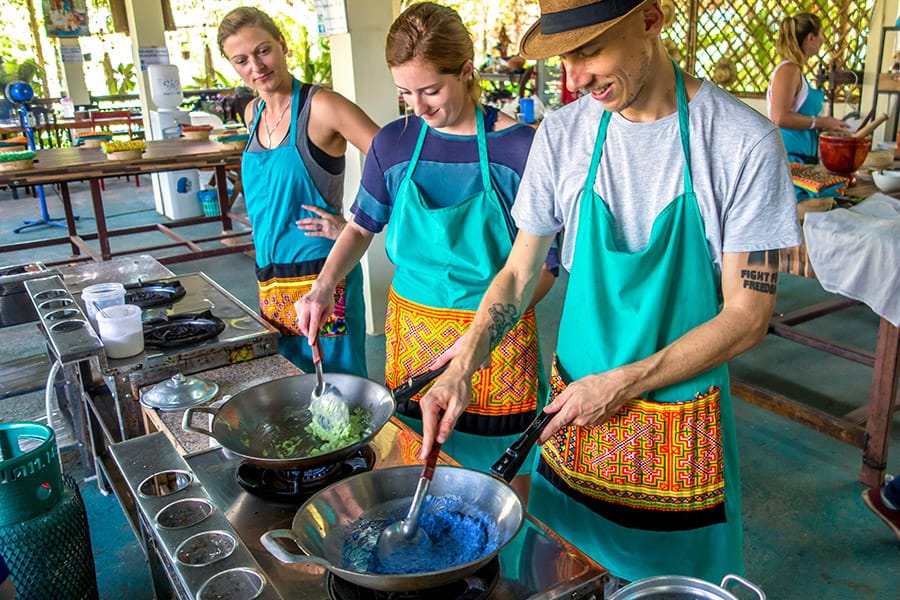From Market to Table: The Journey of Thai Cuisine Through Cooking Classes
Introduction
In Thailand, food is more than nourishment — it is a language of connection, a bridge between people, nature, and tradition. Joining a Thai cooking class is not just about mastering recipes; it’s an exploration of balance, flavor, and mindfulness. From vibrant markets brimming with tropical produce to serene kitchens surrounded by rice fields, each experience reveals a culture that cooks with heart and harmony.
The Essence of Thai Culinary Learning
Whether in a bustling Bangkok cooking school or a countryside homestay in Chiang Mai, Thai cooking classes invite participants to engage all five senses. The journey begins in the market — a kaleidoscope of sights and smells where baskets overflow with lemongrass, galangal, kaffir lime, chili, and basil. Under the guidance of local chefs, guests learn how to choose ingredients not only for taste but for energy, freshness, and balance.
In the kitchen, the lesson becomes a dance: the rhythmic pounding of curry paste in a mortar, the hiss of coconut milk hitting a hot wok, the scent of herbs blending into steam. Dishes like Tom Yum Goong, Pad Thai, and Green Curry come alive through a process that emphasizes timing, texture, and the harmony of sweet, sour, salty, spicy, and bitter — the soul of Thai cuisine.
Cooking Schools Across Thailand
Bangkok – Urban Culinary Mastery
Modern yet authentic, schools such as Baipai Thai Cooking School and Silom Thai Cooking School introduce participants to the refined art of Thai cooking with expert guidance and professional kitchens.
Chiang Mai – Lanna Heritage and Home-Style Cooking
Nestled amid mountains and rice paddies, schools like Thai Farm Cooking School and Somphet Market classes highlight organic, farm-fresh ingredients and home recipes passed down through generations.
Phuket & Koh Samui – Coastal Flavors
Here, seafood takes center stage. Participants learn how to balance the briny richness of prawns or crab with coconut, lemongrass, and lime in seaside kitchens overlooking the Andaman.
Ayutthaya – Historic Culinary Traditions
In this former royal capital, cooking schools often include temple visits and lessons on ancient royal recipes — a window into Thailand’s culinary evolution.
The Experience – From Market to Masterpiece
Each cooking class unfolds as a journey in itself.
Participants begin by exploring the local market, tasting exotic fruits and discovering how regional variations influence Thai flavors. Back in the kitchen, they prepare multiple dishes under the chef’s guidance, learning knife skills, spice balancing, and plating aesthetics. The day concludes with a shared meal — a joyful celebration of effort, discovery, and delicious harmony.
Cooking in Thailand is never solitary; it’s an act of community, and these classes embody that spirit — bringing people together through the shared language of food.
🕰️ Suggested Culinary Itinerary
Day 1 – Bangkok Market & Cooking Class
Morning market tour (Or Tor Kor or Khlong Toei).
Learn to prepare Tom Yum Goong, Pad Thai, and Thai iced tea.
Enjoy lunch together; receive recipe booklet.
Day 2 – Chiang Mai Farm Experience
Visit organic farm; pick herbs and vegetables.
Cook Northern Thai specialties such as Khao Soi and Sai Ua.
Evening free to explore local night markets.
Day 3 – Phuket Seafood & Sunset Session
Morning fishing village tour or seafood market visit.
Prepare Green Curry with fresh prawns, spring rolls, and desserts.
Dinner with ocean view; optional Thai dessert workshop.
💶 Pricing & Services
| Package Type | Duration | Accommodation | Price / Person (€) | Inclusions |
|---|---|---|---|---|
| Classic Thai Cooking Class | 1 Day | — | €120 | Market visit, 3-course class, English-speaking chef, recipe booklet, lunch |
| Regional Culinary Experience | 2 Days / 1 Night | 3★ City Hotel or Farm Stay | €310 | All Classic inclusions + farm tour, 6-dish workshop, airport transfers |
| Thai Cuisine Master Journey | 3 Days / 2 Nights | 4★ Boutique Hotel | €560 | All Regional inclusions + seafood session, dessert class, certificate & souvenir apron |
Sample Classes & Schools
Baipai Thai Cooking School (Bangkok): €90 / half-day – professional setup with chef instruction.
Thai Farm Cooking School (Chiang Mai): €85 / day – organic farm visit included.
Phuket Thai Cookery School: €120 / day – seafood focus, ocean-view classroom.
All prices include taxes, market fees, transfers, and ingredients. Vegetarian and vegan options available at all schools.
🌶️ Optional Add-Ons
🍤 Thai Dessert Class (Mango Sticky Rice, Coconut Jelly): €35 pp
🧂 Spice & Curry Paste Workshop: €40 pp
🫖 Thai Tea & Coffee Brewing Session: €25 pp
📸 Market Photography Experience: €60 per couple
🥥 Private Chef Dinner with Your Creations: €95 per couple
🌸 Practical Tips
Best Time: Year-round; morning classes recommended for cooler weather.
Dress Code: Comfortable, light clothing; aprons provided.
Etiquette: Respect local chefs’ methods — tasting and adjusting flavors is encouraged.
Souvenirs: Handmade mortars, spice sets, and recipe books make meaningful mementos.
Sustainability: Choose schools that use local farms and minimize food waste.
Conclusion
To cook Thai food is to understand Thailand itself — a nation that balances flavor, texture, and life with effortless grace. From the morning bustle of markets to the quiet satisfaction of a shared meal, each step reveals how food connects people, places, and purpose. A Thai cooking class is more than instruction; it is immersion — an edible expression of Thailand’s heart, harmony, and hospitality.

.jpg)

.jpg)
.jpg)
.jpg)
.jpg)
.jpg)
.jpg)
.jpg)
.jpg)
.jpeg)
.jpg)
.jpg)
.jpg)
.jpg)
.jpg)
.jpg)
.jpg)
.webp)
.jpg)
.jpeg)
.jpg)